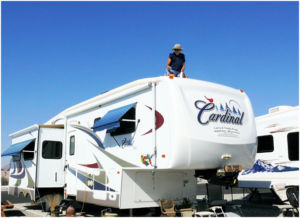How To Ship An RV Across The Country

When it comes to transporting an RV, safety should be your primary concern. Safely hauling an RV is not something where you just load it up, hoping for the best. You will need an experienced team of licensed and insured drivers able to use specialized equipment that also conforms to the rules and regulations laid out by the Department of Transportation. Having complete trust in the transport company is paramount. Here are five important tips to be aware of before you ship your RV anywhere in the country.
How Are RV’s Shipped?
- Flatbed Trailer: RV’s are usually transported on a flatbed trailer. This type of trailer is able to haul multiple RV’s at once and for long distances.
- Towing Services: Using a towing service to haul your RV requires special equipment and trucks for its safe loading and transport. The type of equipment or truck needed will depend on the type of RV you have as well as its size.
- Drive Away Services: With this type of transport method, a driver is dispatched to personally drive your RV to its destination. With this method, no equipment or additional vehicle is required.
RV Shipping Preparation Checklist
- Be sure to secure all doors and any windows or cabinets.
- Secure any items hanging on walls or take them down completely.
- Make sure all appliances or electronics are turned off.
- Turn off the power supply and gas lines.
- Make sure that the parking brake and turn signals are functional.
- Check for any leaking fluids.
- Inspect the battery.
- Make sure the tires are in good condition and have the proper air pressure.
These are some of the more important things to keep in mind when preparing your RV for shipment. You can also check out the RV’s owner manual to look for any specific information about shipping your RV. While this process can take some time, it will ensure that your RV transport goes smooth and arrives in good condition.
How Much Will RV Shipping Cost?
The cost of transporting your RV will depend on several variables including the distance being travelled and the weight and dimensions of the vehicle itself. You can expect to pay around $3.40 per mile for an RV shipment travelling less than 100 miles and just over a $1.10 for trips going over 1,000 miles. Keep in mind that you may actually pay more than these average costs depending on the season and demand. The price of fuel also plays a large role in the cost of shipping an RV.
How To Choose The Right Transport Company?
Transport companies can all vary depending on the company. While some will have your best interests in mind, others only care about how much money they can make off of you. The best way to make sure you are dealing with a reputable company is to do your due diligence.
As with most RV owners, price is still a major point. It’s important to be aware that most companies offering the cheapest rates are often the ones with the poorest service and have a reputation that is questionable at best.
Your due diligence should include the following:
- Looking into the transport company’s credentials
- Reading all the customer reviews left on Google, Yelp, BBB etc…
- Being aware of the transport company’s insurance policy and what they cover. You are entitled to this information and if they can’t or won’t provide it you should walk away.
- Making sure that their drivers have transported RV’s before and have experience handling these types of vehicles.
While this may appear as a time consuming process, this information usually is readily available. By doing your homework first you can save yourself a lot of potential headache.
How To Handle Damages Incurred During Transport?
This is something that any customer worries about when shipping something as valuable as an RV. Be sure to take the appropriate preventative measures, have appropriate RV transport insurance coverage and be aware of the coverage the shipping company has. You should be asking the transport company questions like:
- How much damage to the RV is covered by the shipper’s insurance policy?
- What exactly will the insurance policy cover and what isn’t covered?
It’s also important to take pictures off all sides of your vehicle before it’s loaded onto the driver’s trailer. When your vehicle is delivered you will want to thoroughly inspect the RV with the driver. By properly documenting everything, you will be prepared in the event something does happen. In the rare event your RV is damaged during transport, be sure to contact the insurance company immediately. Most transport companies will try to make sure you have a good experience. Remember to be kind but also persistent. If you have to go through the hassle of hiring a transport company to ship your RV, it’s to be expected that it be delivered in one piece.






